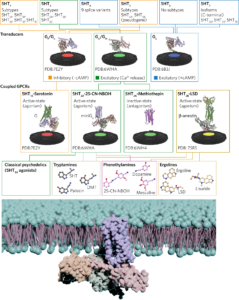The landscape of psychedelics is undergoing a profound transformation, marked by shifting legal, medical, and societal perspectives. In this blog, we will delve deeper into what the future might hold for psychedelics, exploring their potential in medicine, society, business, and beyond.
Medicalization and Legalization
Continued Medical Research: Psychedelics, such as psilocybin and MDMA, are currently the focus of extensive research into their therapeutic potential. Studies have shown promising results in treating mental health conditions like depression, PTSD, and anxiety. In the coming years, we can expect this research to expand, possibly leading to regulatory approval for psychedelic-assisted therapies.
Decriminalization and Legalization: Some U.S. cities and states have taken steps to decriminalize or legalize psychedelics for personal or therapeutic use. This trend may continue, reflecting a broader shift in public attitudes and beliefs surrounding these substances.
Mainstream Acceptance
Shift in Public Perception: As scientific research continues to demonstrate the therapeutic potential of psychedelics, the general public’s perception is gradually shifting. People are becoming more open to the idea that psychedelics can be used as a legitimate form of treatment for various mental health issues.
Example: The Multidisciplinary Association for Psychedelic Studies (MAPS) conducted several studies on MDMA-assisted therapy for PTSD. Positive results from these studies were widely covered in the media, contributing to a change in how the public views MDMA and its potential to help those suffering from trauma.
Integration into Mental Health Care: Psychedelic-assisted therapies are poised to become an integral part of mental health care. Trained professionals, such as therapists and psychiatrists, could administer these treatments in clinical settings, providing patients with new and innovative approaches to healing and personal growth.
Example: In clinical trials, psilocybin-assisted therapy has shown remarkable effectiveness in helping individuals with treatment-resistant depression. If approved, this treatment could be administered by trained mental health professionals, making it accessible to those who have exhausted other treatment options.
Research and Training: As psychedelics gain acceptance in mainstream healthcare, there will be a growing need for comprehensive training programs to educate healthcare providers on the safe and effective use of these substances in therapy. This will ensure that qualified professionals can provide the necessary support for patients.
Example: The Usona Institute and other organizations are investing in therapist training programs to prepare mental health practitioners for administering psychedelic therapies safely and responsibly.
Incorporating Holistic Approaches: Psychedelic-assisted therapies often involve a holistic approach to mental health treatment. This means addressing not only the symptoms but also the underlying causes of mental health disorders, which aligns with the growing interest in holistic well-being.
Example: Patients undergoing psychedelic-assisted therapy for addiction may not only experience reduced cravings but also gain insights into the root causes of their addictive behaviors, helping them achieve lasting recovery.
Diverse Applications: Psychedelic therapies may find applications beyond mental health, including personal growth, creativity enhancement, and spiritual exploration. This broad spectrum of uses could further contribute to their mainstream acceptance.
Example: Silicon Valley professionals and artists have reported using microdosing techniques with psychedelics like LSD or psilocybin to boost creativity and problem-solving abilities. This trend has gained attention in the mainstream media and is changing the conversation around psychedelics.
Legislative Changes: As psychedelics move toward mainstream acceptance, legislative changes may follow. These changes could include the decriminalization or legalization of certain psychedelics for medical or therapeutic use.
Example: The city of Denver, Colorado, made headlines by becoming one of the first places in the United States to decriminalize psilocybin mushrooms, marking a significant shift in drug policy.
Public Awareness Campaigns: Advocacy groups and organizations are working to raise public awareness about the benefits and risks of psychedelics, demystifying these substances and reducing stigma.
Example: The Beckley Foundation, led by Amanda Feilding, has been at the forefront of research and advocacy for psychedelic therapies, helping to shape public discourse and support for these treatments.
Business and Investment
Emerging Market: The psychedelics industry is already attracting significant investment, similar to the early days of the cannabis industry. Companies are developing innovative products and therapies, and investors are seeking opportunities for growth and profit.
Ethical Considerations: As the industry expands, ethical concerns will emerge, including issues related to responsible business practices, equitable access, and the prevention of over-commercialization. Striking a balance between profit and ethical responsibility will be crucial.
Research and Innovation
New Compounds and Delivery Methods: Researchers may explore novel psychedelics and alternative delivery methods to enhance safety and efficacy. This innovation could lead to more targeted therapies and a reduction in potential side effects.
Understanding Mechanisms: A deeper understanding of the neurobiology of psychedelics may result in the development of more precise therapies and a better grasp of their effects on the brain.
Regulatory Challenges
Regulation and Standardization: Governments will face the challenge of regulating psychedelics to ensure safety and prevent misuse, while simultaneously promoting research and therapeutic use. Striking the right balance will be paramount.
International Cooperation: Harmonizing international regulations will be essential as the psychedelics industry expands across borders. Global cooperation can help streamline access to these therapies and ensure consistency in safety standards.
Education and Harm Reduction
Public Education: With increased accessibility to psychedelics, there will be a growing need for comprehensive education about their risks, benefits, and responsible use. Ensuring that the public is well-informed can help mitigate potential harm.
Harm Reduction: Efforts to minimize risks associated with psychedelics, such as bad trips and potential psychological distress, will remain a priority. Communities will continue to promote harm reduction strategies and support for those who choose to explore these substances.
Shifting Cultural Norms: The acceptance and use of psychedelics may challenge traditional societal norms and foster discussions about consciousness, spirituality, and personal growth. Society may become more open to exploring altered states of consciousness as a means of self-discovery and healing.
Impact on Mental Health: Widespread adoption of psychedelic therapies may contribute to a broader conversation about mental health. It could underscore the importance of holistic approaches to well-being, emphasizing the interconnectedness of mind, body, and spirit.
Conclusion
The future landscape of psychedelics is a dynamic and evolving one, influenced by scientific discoveries, legal decisions, cultural shifts, and societal attitudes. Responsible, evidence-based approaches will be crucial to harness the potential benefits of these substances while minimizing risks. As we journey forward, the promise of psychedelics as a transformative force in medicine and society may become increasingly realized, offering hope to those in search of healing and personal growth.













